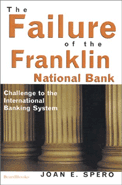|
|
|
|
||||||

|
The Failure of the Franklin National Bank: Challenge to the International Banking System
By Joan Edelman Spero 1999/10 - Beard Books 1893122344 - Paperback - Reprint - 245 pp. US$34.95 This book provides a dramatic lesson illustrating the need for international cooperation to manage bank crises and to set common standards to help prevent financial crises in the future. Publisher Comments This study examines the failure of the Franklin National Bank and the international banking crisis of 1974-1975. It discusses the changes in banking regulations and practices that contributed to Franklin's problems. It further explains how the failure of the Franklin National Bank and the Herstatt Bank forced bank regulators and policy makers to address the new international nature of banking and the dramatic changes in international financial markets. Review by Susan Pannell In 1974 the international financial system faced its most serious crisis since the 1930s, The stresses and shocks of that year, Including the failure of the Franklin National Bank, led to a crisis of confidence that brought the international banking system dangerously close to disaster. Franklin's failure forced Unites States and foreign regulatory authorities to devise new ways to avert an international banking crisis, and served as a catalyst for later efforts to bring international banking under public management. The author's case study, first published in 1979 when events were very fresh, examines the failure of the Franklin - once the twentieth largest bank in the United States- within the context of the banking crisis, Franklin's collapse was both cause and effect: changes in banking regulation and practice contributed to the bank's problems, while its collapse forced bank regulators and policymakers to address the new international nature of banking and to cooperate in addressing dramatic changes in international financial markets, and, hopefully, avoiding a repeat of the crisis. The book begins by reviewing the economic and political factors that led to the internationalization of American banks, as many banks became multinational corporations. This phenomenon surged during the 1960s and 1970s, carrying the Franklin (which even acquired a foreign owner, Italian financier Michele Sindona) with it, The work then examines the extent to which the Franklin's demise was caused by its international activities and, in turn, the manner in which Franklin's insolvency threatened the international banking system. After analyzing the crisis's antecedents, the book moves to a discussion of United States regulatory responses to control it, and explains how American authorities were forced to take innovative steps to manage the international dimensions of the Franklin crisis, Those steps included a massive Federal Reserve loan and the use of that loan to cover foreign branch outflows, assistance in managing foreign exchange operations and the eventual purchase of Franklin's foreign exchange book, and the FDIC sale. Not even those bold regulatory approaches sufficed to stem the crisis, however; United States regulators were obliged to seek assistance from other nations' financial authorities. The cooperative approach not only prevented the crisis from devolving into a crash, but also laid the groundwork for increased cooperation in the future. This achievement, the author concludes, was the lasting (and beneficial) effect of the failure of the Franklin National Bank, The Franklin episode, thus, revealed both the weaknesses and the strengths of the United States' regulatory system as it applies to international banking,
In 1993, President Clinton appointed her to the U.S. Department of State as under secretary of economic, business, and agricultural affairs. She played a central role in formulating the administration's foreign economic policy. She also served as a top advisor on the G7 economic summits. She has authored several books, including The Politics of International Economic Relations (5th Edition, 1997) and The Failure of the Franklin National Bank (1980). She also has contributed to numerous professional journals. Spero was named president of the Doris Duke Charitable Foundation in January 1997. She is responsible for establishing and directing the activities of the foundation. Spero is a member of the American Academy of Diplomacy, the Council on Foreign Relations, and the Council of American Ambassadors. She is a trustee emerita of Amherst College, a trustee of The Brookings Institution and the Wisconsin Alumni Research Foundation, and a director of First Data Corporation.
|
|
|
|
home
| about us
| contact us
| related
sites |